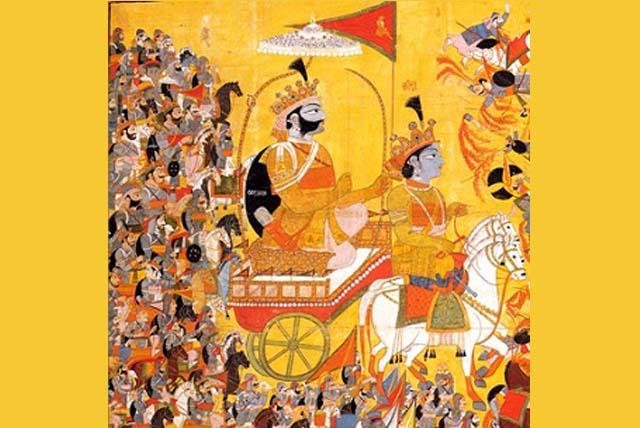The message of The Gita

The influence of the Bhagavad Gita
The Bhagavad Gita presents questions such as: How can someone live a life spiritually meaningful without withdrawing from society? What can someone who does not want to give up family and social obligations do to live the right way?
About dharma: Dharma means “what is right”. Krishna asks Arjuna to follow his svadharma “the dharma that belongs to a particular man.” The Dharma is a holy duty that everybody has to fulfill in life.
Krishna explains Arjuna the reason why he has to fight against the Kauravas.
- Atman (the self) is eternal
Krishna says: “One believes he is the slayer, another believes he is the slain. Both are ignorant; there is neither slayer nor slain. You were never born; you will never die. You have never changed; you can never change. Unborn, eternal, immutable, immemorial, you do not die when the body dies.” (Bhagavad Gita 2:19-20).
- You must accomplish your duty or dharma. Arjuna is a warrior, to fight is the reason of his existence. It is not sinful to fulfill your duty in life.
- That inaction is impossible. Life is action. You have to choose and take decisions in life.
- The most important is the intention behind the actions, not the action
- There are ways to act where we can do what we have to do without creating bad karma.
There are 3 ways: Jnana yoga (the way of knowledge), Bhakti yoga (the way of devotion) and Karma yoga (the way of action).
The 3 ways
- Jnana yoga (Chapters 13 – 18). The way of knowledge. This way holds that life and death are not real. Selfhood is nothing but an illusion. All we see are manifestations of the oneness. Once we realize that the oneness is behind all things, we can escape the bad karma from acting. Krishna says: “I am ever present to those who have realized me in every creature. Seeing all life as my manifestation, they are never separated from me.” (Bhagavad Gita 6:30)
- Bhakti yoga (Chapters 7 – 12). The way of devotion. This idea holds that our actions can be dedicated to God by surrendering our will to him, and he will take upon himself any bad karma.
- Karma yoga (Chapters 1 – 6). The way of action. If we act in such way as not to get attached to the fruits of our actions, we can be more effective. Sometimes emotions like embarrassment, fear, or anxiety can interfere in the outcome of what we do. Krishna says: “Thinking of objects, attachment to them is formed in a man. From attachment longing, and from longing anger grows. From anger comes delusion, and from delusion loss of memory. From loss of memory comes the ruin of understanding, and from the ruin of understanding he perishes.” (Bhagavad Gita 2:62-63).
